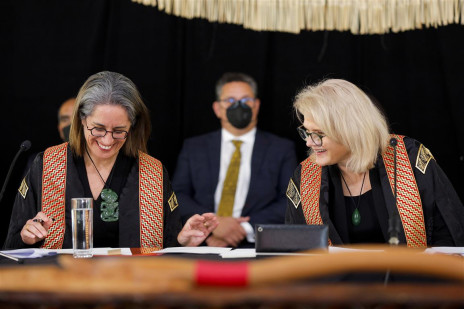How is a judge appointed?
Contents
District court judges
Senior court judges
What are the criteria for appointment?
A judiciary that reflects the community it serves
Who are our judiciary?
Footnotes
Judges and judicial officers are appointed by the Governor-General, acting on the advice of the Attorney-General.[1]
The Attorney-General is a member of the Executive (Government). When recommending an appointment there is a constitutional convention in Aotearoa New Zealand that the Attorney-General acts independently of the Government and is not influenced by party politics.
District court judges
The Attorney-General consults with the Chief District Court Judge or Principal Judges of the Youth Court and Family Court when recommending the appointment of a District Court, Youth Court or Family Court Judge. The Attorney-General also consults with the Chief District Court Judge when recommending the appointment of an Employment Court Judge.
Environment Court Judges are District Court Judges appointed under the Resource Management Act 1911. The Attorney-General consults with the Minister for the Environment and the Minister of Māori Affairs on these appointments, and then advises the Governor-General.
The appointment process for these judges is managed by the Secretary for Justice, who is the head of the Ministry of Justice.
Māori Land Court Judges are appointed by the Governor-General on the recommendation of the Minister of Māori Affairs. The appointment process is managed by Te Puni Kōkiri |Ministry of Māori Development.
Senior court judges
For appointments to the senior courts (Supreme Court, Court of Appeal and High Court) the Attorney-General consults with the Chief Justice and the head judge for the relevant court. The appointment process is managed by the Crown Law Office.[2]

What are the criteria for appointment?
The criteria for appointment to each court differs according to the needs of the particular court, but all candidates for judicial appointment are assessed on their legal ability, personal qualities of character (including honesty, integrity, open-mindedness, impartiality, and courtesy), technical skills (such as communication, mental agility, and organisational skills), and ability to ensure the court reflects the community it serves.
A judiciary that reflects the community it serves
The judiciary recognises that diversity of experience, in terms of gender, ethnicity, socio-economic background, and life experience is important, and affects the judicial response to the cases that come before the courts by contributing to the strength and flexibility of judicial reasoning. The judiciary encourages lawyers from diverse backgrounds to seek judicial appointment.
The head judge for the court works with the Attorney-General to ensure diversity among those who are appointed to be judges. Diversity ensures richness of thought and experience in the judiciary, which contributes to the development of the law so that it remains fit to serve all of society.
Who are our judiciary?
In October 2021, Te Awa Tuia Tangata | the Judicial Diversity Committee conducted a survey of current judges across all courts. The survey was designed to provide a comprehensive basis for assessing where any diversity gaps might be and to enable progress to be measured in the future. The survey results have informed this work across the judiciary and identified barriers that are being addressed to support judicial diversity.
Judicial diversity survey
Judicial diversity survey results
Footnotes
[1] Except in the case of the appointment of the Chief Justice when the Governor-General acts on the advice of the Prime Minister.
[2] The Crown law Office provides legal advice and representation services to the Government.
